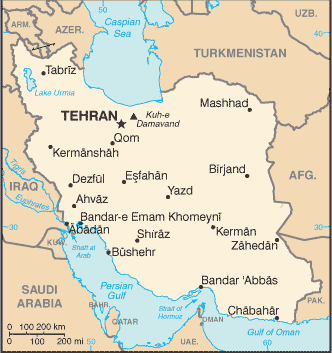US Defense Secretary Leon Panetta admitted on Monday that increasingly harsh economic sanctions on Iran have not altered Iran’s position, but he still argued for more of it.
 “These sanctions are having a serious impact in terms of the economy in Iran,” he said. “And while the results of that may not be obvious at the moment, the fact is that they have expressed a willingness to negotiate and they continue to seem interested in trying to find a diplomatic solution,” he said.
“These sanctions are having a serious impact in terms of the economy in Iran,” he said. “And while the results of that may not be obvious at the moment, the fact is that they have expressed a willingness to negotiate and they continue to seem interested in trying to find a diplomatic solution,” he said.
Actually, they’ve been expressing interest in an diplomatic solution for years in the face of US intransigence. Earlier this month, Secretary of State Hillary Clinton said Iranian concessions, which have included stopping all 20% uranium enrichment, are “non-starters.”
After the failed talks in 2009 and 2010, wherein Obama ended up rejecting the very deal he demanded the Iranians accept, as Harvard professor Stephen Walt has written, the Iranian leadership “has good grounds for viewing Obama as inherently untrustworthy.” Former CIA analyst Paul Pillar has concurred, arguing that Iran has “ample reason” to believe, “ultimately the main Western interest is in regime change.”
Panetta shouldn’t act surprised: historically speaking, sanctions are very ineffective. Renowned international relations theorist Kenneth Waltz recently wrote in Foreign Affairs that “the current sanctions on Iran can be dropped,” since “they primarily harm ordinary Iranians, with little purpose.”
“The Iranian government is unlikely to buckle due to Western pressure. And it is even less likely to back down in the face of domestic pressure,” Mohammad Ali Shabani, based in Tehran, writes at Al Jazeera.
The sanctions placed on the Iranian economy have ushered in runaway inflation, cuts in government subsidies, and high unemployment. The supposed purpose behind the economic warfare is to pressure Iran away from developing nuclear weapons, even though Washington admits Iran has no weapons program and has not made the decision to start one.
The sanctions are having impoverishing effects on millions of innocent Iranians. “Prices of fruit and sugar, among other staples, have soared – in some cases showing threefold and fourfold increases,” writes Saeed Kamali Dehghan in the Guardian. “The price of meat, an essential ingredient of Iranian food, has gone up to such an extent that many now eat it only on special occasions.”
Even though the punitive measures don’t directly target supplies such as medicines, sick Iranians in desperate need of life-saving medicines have been met with shortages.
The harsh and irrational economic measures could also have the effect of making conflict more likely. Columbia University Professor Gary Sick has called the sanctions effort “the equivalent of a blockade. It’s an act of war.” Trita Parsi, of the National Iranian American Council, wrote back in March that “the sanctions strategy on Iran will very soon reach [the] point” of escalating the situation with Iran to one of “two policies: Regime change or war. Or Both.”


